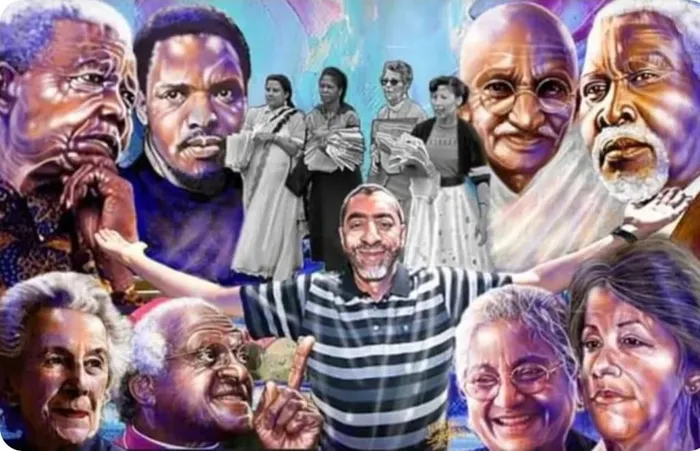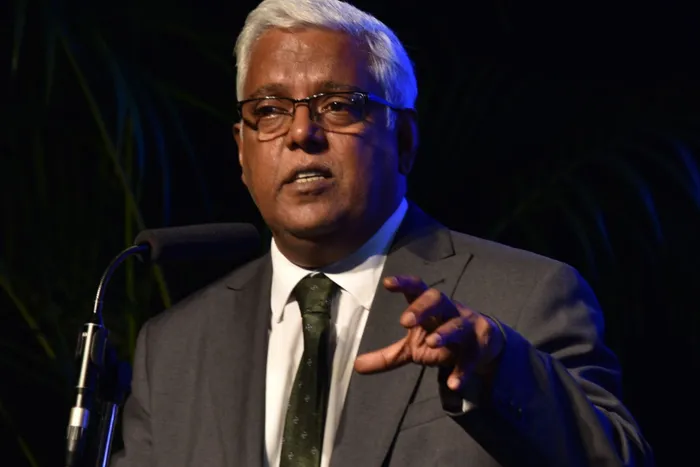Healing the wounds of the July 2021 unrest: a path to unity and reconciliation
Nation building

In a bid to promote peace, cartoonist Nanda Soobben painted this peace mural in Chatsworth after the July unrest to promote social cohesion.
Image: Nanda Soobben
On the 4th anniversary of the July 2021 unrest, RAVI PILLAY explores the ongoing challenges of nation building in South Africa, the need for unity, and the importance of the National Dialogue in healing our communities
“TOWARDS Nation Building” is the title of a comprehensive submission that some of us made to the Human Rights Commission at its national investigative hearing into the July 2021 unrest.
As we approach the 4th anniversary of this most traumatic period in our democratic era, we have to confront the reality that we have not moved forward towards nation building. At best we have treaded water.
Many will argue that we have regressed. I remain convinced that there is an overwhelming body of goodwill among the majority of our people who are ready to support any credible effort towards unity and nation building.
Yet there remains this wound that has not healed and which without care, may fester. Some 350 people died. Their families need closure.
The issues are complex and difficult. I am inspired by the potential of the National Dialogue. It is the first opportunity since the Freedom Charter in 1955 (it is the 70th anniversary this year) and the adoption of our Constitution in 1996, for a grass-roots, people driven conversation and a new, substantially national, consensus and direction.
The July 2021 unrest could be one important part of the conversation, especially in our province of KwaZulu-Natal.
Our submission to the HRC was comprehensive. It is useful to recall a few salient aspects:
- We remain deeply committed to the building of a united, non-racial society and entrenching the values espoused in our Constitution - “heal the divisions of our past and establish a society based on democratic values, social justice and fundamental human rights”.
- We cannot avoid the characterisation of the unrest as an "attempted insurrection" which included: incitement primarily through an intensive social media campaign; mobilisation by highlighting grievances relating to poverty and unemployment; incentivising by using money to instigate as documented; and organising through the use of "advance teams" who would break into identified targets creating access for others to loot, and then setting fire to property in a manner designed to cause maximum damage.
One security expert suggested that the organized objective was to provoke an over-reaction from security forces leading to mass deaths which in turn lead to a mass uprising leading to a collapse of the state.
- The economic damage was devastating and calculated at R50 billion.
- Not many knew that we were 48 hours away from a full-blown food crisis. Fuel trucks were unable to refuel petrol stations. Delivery trucks were unable to reach retailers – the shelves were empty.
It took an extraordinary effort to restore fuel supplies, secure the roads and replenish supplies in time.
- The submission also reflects on corruption and the culture of impunity that had developed leading to the type of complete lawlessness that was witnessed.
- The role of the police, the intelligence services and lack of coordination until the SANDF was deployed, and delayed at that.
- At least 350 people died. Initially all of these deaths were attributed to the Phoenix area until it was clarified that the Phoenix mortuary served a very large area beyond Phoenix. It was finally assessed that 36 deaths occurred in the Phoenix area. But the damage had been done.
Phoenix became the focus area and it was alleged that the deaths were racially motivated. The narrative held. Rational analysis became impossible. Others asked: did the killings cause the unrest? Or, did the unrest cause the killings? We must refuse to be stereotyped whichever community we may hail from.
The Human Rights Commission subsequently produced a report that made various credible findings and recommendations and does not use the highly provocative term “massacre”.
The Commission for Religious and Linguistic Rights produced a “report” that consisted of some 21 slides. Despite repeated requests it was only some two weeks ago on June 25, 2025, that we were provided with a full report. Notwithstanding very grave reservations, patriotic South Africans must be committed to working with our chapter 9 institutions and all stakeholders to implement the many progressive recommendations that have emerged. However, progress has been slow. Prosecutions have been few and far between. The main instigators still escape accountability.
This has to be challenged.
It is very important to record that the submission to the HRC includes inter alia the following: “. . . we too are outraged and appalled by the brutality of the violence that marked several of the incidents. We condemn the perpetrators who carried out these vicious acts, without qualification …”
Our humanity demands that we recognise those innocent people who were victims of the violence and that there is pain and suffering which endures until today. There are individuals and families who need closure.
The Human Rights Commission and Commission for Religious and Linguistic Rights are jointly embarking on a process that seeks to bring this closure.
It is a process that raises many difficult issues but the intention is in good faith and seeks to bring communities together and promote reconciliation.
However not enough groundwork has been done.
The commissions understand this and therefore resolved that on this anniversary they cannot go beyond launching the process.
We await announcements in this regard. While experts in these social processes will be essential, it is clear that this initiative cannot succeed without the active participation of community organizations and leaders. Religious leaders in particular have a special role to play.
Finally, as we reflect on this 4th anniversary, and in anticipation of the National Dialogue, we must draw a distinction between the very important soft issues of humanity or Ubuntu, religion, culture, language and sport on the one hand, and economic inequality on the other.
We must resist those who seek to infuse a toxic overlap between race and inequality. An economic growth and development vision that is fair and just for all becomes fundamental to a sustainable future for all South Africans.

Ravi Pillay
Image: File
Ravi Pillay is an ANC activist and former KZN MEC for Finance
** The views expressed do not necessarily reflect the views of IOL or Independent Media.
Related Topics: